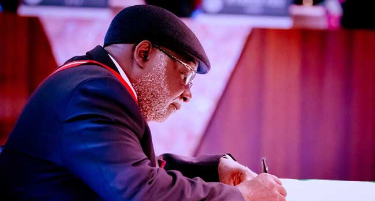The Chief Justice of Nigeria, Justice Olukayode Ariwoola, is set to swear in twelve newly appointed judges of the High Court of the Federal Capital Territory on Wednesday, July 10. This significant event marks a notable addition to the judiciary, aiming to enhance the administration of justice within the nation.
According to an official statement released by Dr. Festus Akande, the Director of Press and Information of the Supreme Court, the swearing-in ceremony will take place at the Main Courtroom of the Supreme Court of Nigeria at 10:00 am. This ceremony underscores the Supreme Court’s ongoing efforts to strengthen the judicial system by incorporating capable and dedicated judges.
The list of new judges comprises individuals from diverse states, reflecting the federal character principle aimed at ensuring representation from various regions of the country. The new judges include Justice Buetnaan Mandy Bassi from Plateau State, Justice Ademuyiwa Olakunle Oyeyipo from Kwara State, Justice Bamodu Odunayo Olutomi from Lagos State, Justice Iheabunike Anumaenwe Godwin from Imo State, Justice Odo Celestine Obinna from Enugu State, and Justice Hauwa Lawal Gummi from Zamfara State.
In addition to these esteemed individuals, Justice Sarah Benjamin Inesu Avoh from Bayelsa State, Justice Maryam Iye Yusuf from Kogi State, Justice Ariwoola Oluwakemi Victoria from Oyo State, Justice Lesley Nkesi Belema Wike from Rivers State, Justice Ibrahim Tanko Munirat from Bauchi State, and Justice Abdulrahman Usman from Taraba State will also be taking the oath of office.
 The appointment of these judges follows a rigorous selection process aimed at identifying individuals with exemplary legal acumen and a strong commitment to justice. Their induction into the High Court of the Federal Capital Territory is expected to bring a wealth of experience and diverse perspectives to the judiciary, enhancing the court’s capacity to handle complex legal matters and deliver fair and timely justice.
The appointment of these judges follows a rigorous selection process aimed at identifying individuals with exemplary legal acumen and a strong commitment to justice. Their induction into the High Court of the Federal Capital Territory is expected to bring a wealth of experience and diverse perspectives to the judiciary, enhancing the court’s capacity to handle complex legal matters and deliver fair and timely justice.
Justice Olukayode Ariwoola’s role in swearing in these new judges is particularly significant, given his position as the Chief Justice of Nigeria. His leadership and vision for the judiciary are crucial in guiding the newly appointed judges as they undertake their responsibilities. The swearing-in ceremony is not just a formal event but a moment that signifies the beginning of a new chapter for these judges, who are tasked with upholding the rule of law and ensuring that justice is served without fear or favor.
The judiciary in Nigeria plays a pivotal role in the country’s democratic framework, serving as the guardian of the constitution and the protector of citizens’ rights. The addition of twelve new judges is a step towards addressing the backlog of cases and improving the efficiency of the judicial process. It also reflects the judiciary’s commitment to maintaining high standards of integrity, professionalism, and accountability.
As these new judges prepare to assume their duties, they are expected to bring their unique insights and experiences to bear on their judicial functions. Their diverse backgrounds and areas of expertise will contribute to a more robust and dynamic judiciary, capable of addressing the evolving legal challenges facing Nigeria.
The swearing-in ceremony on July 10 will be attended by dignitaries, legal practitioners, and family members of the new judges, marking a proud moment in the careers of these legal professionals. It is a day of celebration for the judiciary and the nation as a whole, as it underscores the continuous efforts to strengthen the rule of law and ensure justice for all.
In conclusion, the induction of these twelve new judges into the High Court of the Federal Capital Territory is a significant milestone in Nigeria’s judicial history. It represents a commitment to enhancing the judiciary’s capacity and ensuring that it remains a pillar of fairness, integrity, and justice in the country. The nation looks forward to the contributions of these newly appointed judges as they embark on their journey to uphold the principles of justice and the rule of law.




